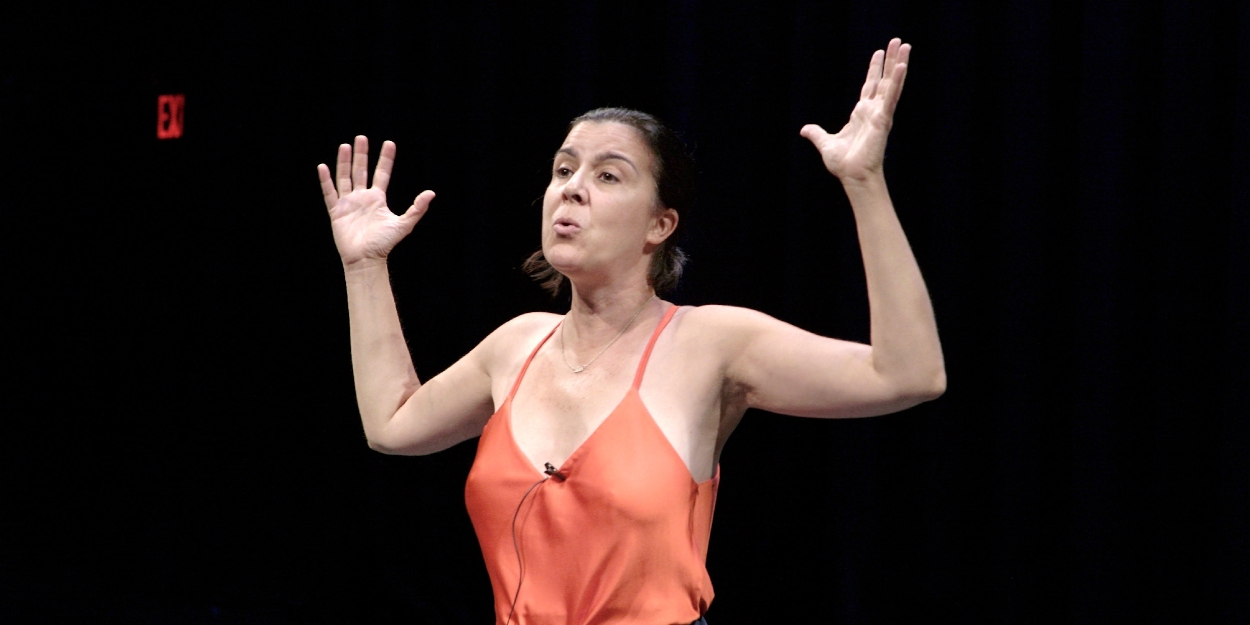
On November 14th, Theater J began its Here I Am series, a "triptych of tour-de-force performances" as plastered on the playbill. Each piece is a one-person show, the first being See You Tomorrow, which runs from November 14th through the 22nd.
See You Tomorrow stars its writer-director, Iris Bahr, and centers around Bahr's experience during the height of the COVID-19 pandemic when she had to fly to Israel to take care of her mother, who had recently suffered from a stroke.
Right at the beginning, the piece deals with universal themes. Bahr regails the audience with the propensity of her mother to "suffocate" her, and the slightly toxic nature of their relationship. She addresses the audience directly, and casually, setting up the character of her mother through anecdotes, before introducing the main conflict: her mother's stroke, and its effect on her life.
.jpg)
She continues to describe her course of action, dropping everything and flying to Israel, and does so mostly standing up. The scenic designer, Nephelie Andonyadis, provided a bare bones, though effective stage, consisting of a bench, and a stool next to a table. The lighting is also mostly minimal. Jesse W. Belsky's design is simple, but punctuates well, and when it needs to.
Bahr makes good use of the space. The piece, thematically and scale-wise is not especially large, or dynamic: its focus is smaller, slightly intimate, and so the focus is on our speaker, which is all very well as Bahr did a good job keeping the audience engaged throughout the 50-minute runtime.
The show, which is a "hilarious and autobiographical look at a mother-daughter relationship unfolding across an ocean," is perhaps only mildly funny. Bahr imitates an impressive amount of accents and colorful characters to effect, however many of the jokes seem slightly forced, and sometimes a tad over-written. Bahr is charming enough, and there were multiple laugh-out-loud moments of the show, however where things felt most pithy, most effective, were when the jokes undercut moments of vulnerability, moments of deep discomfort. At times Bahr would make a joke at the expense of her sick mother, or at her past self, who was desperate, panicked, and depressed. These jokes felt the funniest and worked the best because they were real and universal.
Unfortunately for the world people often lose their parents before they actually pass. Old age takes a toll and one must engage in a perverse parentage of those who raised them. The simple and relatable nature of the show is its strongest facet. However, while the subject matter is moving, and Bahr does a good job presenting it, the piece feels slightly unfinished.
The play is more or less one linear story. Themes are presented along the way, of family, empathy, self-care, and self-confrontation, however, one is never focused on for too long before the show ends abruptly with Bahr describing some sort of epiphany, and then expressing her thanks to the audience. It's not that the epiphany feels wrong, it just feels unelaborated.
This may have something to do with the shorter runtime, which was pleasant and didn't drag, however, combined with the aforementioned issue of slight "unfinishedness" and inconsistent humor makes the ticket price (which starts at 49 dollars) questionably reasonable.
The piece could have more to say, in conversation with Moses, and How to be a Korean Woman, the other two plays in Here I Am, however by itself it is quite moving and intimate. It's at its best when leaning into the mirrored emotions of love and resentment, though perhaps not all it could, or will be. It deals with heavy subject matter, though leaves an audience feeling light.
Information on tickets for this show and the others in Here I Am can be found on Theater J's website.
Reader Reviews
Videos

